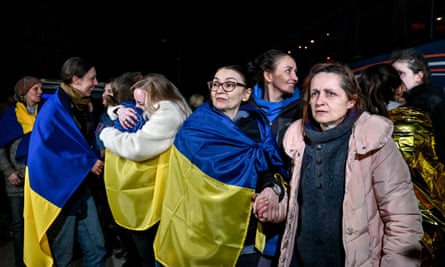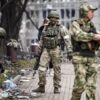The first reparation payments are to be made in the next few weeks to survivors of wartime rape by Russian soldiers during the invasion of Ukraine, in a move that Ukraine’s first lady, Olena Zelenska, called “an important step towards restoring justice”.
Up to 500 Ukrainian survivors of conflict-related sexual violence are being identified and awarded with interim reparations this year, including financial, medical and psychological support.
Zelenska said: “Reparations to victims of gross human rights violations, including victims of conflict-related sexual violence, are not just about economic support. It is an important step towards restoring justice.
“And this justice is needed not only in Ukraine,” she said. “Justice for Ukrainian victims of violence is now a mirror for the world itself.”
According to the Global Survivors Fund, which is administering the project with Ukraine using funds from donor governments, it will be the first time survivors have been awarded reparations during an active conflict.
“Rehabilitation and compensation is an element of reparations, but what survivors find very important is acknowledgment,” said Esther Dingemans, director of the fund, which was launched in 2019 by the Nobel peace prize laureates Dr Denis Mukwege and Nadia Murad to help survivors of conflict-related sexual violence get access to reparations.
“The reparation scheme offers a confirmation that what happened to them is officially recognised. This also sends a message to the broader community,” Dingemans added.

The total number of Ukrainians who have suffered sexual violence inflicted by Russian forces is unknown, as most survivors do not report the crimes. The Global Survivors Fund estimates it to be in the thousands.
Pramila Patten, the UN special representative on sexual violence in conflict, has accused Russia of using rape as a “military strategy”, citing cases of soldiers “equipped with Viagra”.
Lyudmila Huseynova was one of eight Ukrainian civilians released as part of the first all-female prisoner exchange with Russia alongside 100 Ukrainian soldiers in October 2022. She had spent three years imprisoned by separatist forces in the eastern province of Donetsk.
“I have been free for over a year, and I still can’t sleep at night,” she said. “I wake up feeling the disgusting way they touched me.
“Unfortunately there is still a lot of victim-blaming, especially in smaller rural communities. When I was released, we didn’t even have an understanding of what conflict-related sexual violence was.”
When separatist forces occupied her home town of Novoazovsk in Donetsk province in 2014, Huseynova became involved in helping orphaned children on the frontlines by raising donations from across Ukraine. But the Ukrainian-language books she supplied to the children landed her in detention.
“For three years and 13 days, I was kept in an overcrowded cage,” she said. “I didn’t see the sky and the air was heavy with cigarette smoke.
“When I was released I had to re-learn how to use my legs and breathe with my whole chest.”
Upon her release she was taken to a military hospital in Dnipro, but the staff there were not able to deal properly with a survivor of sexual torture.
“The hospital was overcrowded and understaffed,” said Huseynova. “I do not blame the doctors there at all, but they were not prepared to deal with someone like me.
“They didn’t know how to approach or speak to me, which caused more psychological damage in the long term.”
It was her experience that pushed Huseynova to work with the Global Survivors Fund and become an advocate for survivors and other women who are still imprisoned. She hopes that victims of sexual violence will now be surrounded with the support and understanding she was unable to access.




“Survivors leave detention with nothing,” she said. “They have no clothes, no home, no community. Often all their possessions are left in occupied territories and they can’t find work as all their documents are back home.
“Reparations can help, but they need to include holistic physical and mental health support. Women need to have access to a psychologist – not just for a few sessions, but for as long as they need. The trauma of sexual violence does not go away.”
Huseynova said she remains in contact with other Donetsk women who had been detained for years. “I try my best to send them some kind of parcels. No humanitarian mission is working there. No humanitarian aid is sent there. When they’re on their periods these women use stuffing from the old bed mattress.”
Dingemans said Ukrainian civil society and the government had been effective in addressing the stigma surrounding survivors, pointing to Zelenska’s vocal advocacy on the issue as well as new laws making their way through the parliament. If passed, the laws will define conflict-related sexual violence as a distinct crime and set up a national registry to record cases.
Men and boys are also among alleged victims of rape by Russian soldiers in Ukraine, with dozens of cases of sexual violence being investigated within months of the invasion.
Fedir Dunebabin, the Global Survivors Fund’s representative in Ukraine, said: “We know from other contexts that male survivors of conflict-related sexual violence rarely seek help, but surprisingly this has not been the case in Ukraine. Many male survivors are stepping forward to fight for their rights and justice.”
Dingemans said she hoped other countries would look at what the Ukrainian government was doing and that the international community “could support survivors of other conflicts the way they support survivors in Ukraine, which we’re currently not seeing”.
-
Information and support for anyone affected by rape or sexual abuse issues is available from the following organisations. In the UK, Rape Crisis offers support on 0808 500 2222 in England and Wales, 0808 801 0302 in Scotland, or 0800 0246 991 in Northern Ireland. In the US, Rainn offers support on 800-656-4673. In Australia, support is available at 1800Respect (1800 737 732). Other international helplines can be found at ibiblio.org/rcip/internl.html


